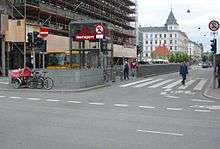Nørreport Station
Nørreport Station is an S-train, metro and main line railway station in Copenhagen, Denmark. It is located in the district of Indre By, and is named after the historic Nørreport city gate, near the original location. It is one of the busiest railway station in Denmark, serving 165,000 people daily. The entire station is underground, with three pairs of platforms: one for S-trains, one for main line trains and one for the metro. The station is located on the Boulevard Line of the S-train and main line network. Several bus lines run through and start from Nørreport above ground.
Nørreport | ||||||||||||||||||||||||||||||||||||||||||||||||||||||||||||||||||||||||||||||
|---|---|---|---|---|---|---|---|---|---|---|---|---|---|---|---|---|---|---|---|---|---|---|---|---|---|---|---|---|---|---|---|---|---|---|---|---|---|---|---|---|---|---|---|---|---|---|---|---|---|---|---|---|---|---|---|---|---|---|---|---|---|---|---|---|---|---|---|---|---|---|---|---|---|---|---|---|---|---|
| S-train, DSB and Copenhagen Metro station | ||||||||||||||||||||||||||||||||||||||||||||||||||||||||||||||||||||||||||||||
Nørreport Station in 2015 | ||||||||||||||||||||||||||||||||||||||||||||||||||||||||||||||||||||||||||||||
| Coordinates | 55°41′00″N 12°34′18″E | |||||||||||||||||||||||||||||||||||||||||||||||||||||||||||||||||||||||||||||
| Owned by | DSB | |||||||||||||||||||||||||||||||||||||||||||||||||||||||||||||||||||||||||||||
| Line(s) | Boulevard Line M1 and M2 | |||||||||||||||||||||||||||||||||||||||||||||||||||||||||||||||||||||||||||||
| Platforms | 3 | |||||||||||||||||||||||||||||||||||||||||||||||||||||||||||||||||||||||||||||
| Tracks | 6 | |||||||||||||||||||||||||||||||||||||||||||||||||||||||||||||||||||||||||||||
| Construction | ||||||||||||||||||||||||||||||||||||||||||||||||||||||||||||||||||||||||||||||
| Structure type | Underground | |||||||||||||||||||||||||||||||||||||||||||||||||||||||||||||||||||||||||||||
| Platform levels | 2 | |||||||||||||||||||||||||||||||||||||||||||||||||||||||||||||||||||||||||||||
| History | ||||||||||||||||||||||||||||||||||||||||||||||||||||||||||||||||||||||||||||||
| Opened | 1 July 1918 19 October 2002 (Metro) | |||||||||||||||||||||||||||||||||||||||||||||||||||||||||||||||||||||||||||||
| Rebuilt | 15 May 1934 (S-train) | |||||||||||||||||||||||||||||||||||||||||||||||||||||||||||||||||||||||||||||
| Electrified | 1934 (S-train), 1986 (Mainline) | |||||||||||||||||||||||||||||||||||||||||||||||||||||||||||||||||||||||||||||
| Services | ||||||||||||||||||||||||||||||||||||||||||||||||||||||||||||||||||||||||||||||
| ||||||||||||||||||||||||||||||||||||||||||||||||||||||||||||||||||||||||||||||
Located in fare zone 1, it serves lines M1 and M2 of the Metro, most S-train lines, regional trains to Zealand and southern Sweden, intercity trains to Esbjerg and international trains to Malmö and Gothenburg, Sweden, and trains to other places, but not express trains. The station has bicycle parking facilities, and bicycles are allowed on board the trains, but not during rush hours.
History
The station opened on 1 July 1918, as part of the tunnel which would connect the stations Østerport and Copenhagen Central Station. S-train service began on 15 May 1934.
In order to let passengers easily change from S-trains and regional trains to the Metro and vice versa, a tunnel was constructed to connect the train platforms with the Metro platforms. The S-train platforms were therefore closed partially from March 2000 to February 2002, allowing only the front-most four doors to open at the station.
With the opening of the first phase of the Metro on 19 October 2002, Nørreport station started serving M1 and M2. The station was the original terminus until it moved to Frederiksberg when phase 2A opened on 29 May 2003.
- Former station building (now demolished)
- One of the entrances to the S-train and regional platforms (the metro can be reached from these two platforms)
 Entrance to the Metro station (the S-train & regional-train platforms cen be reached from the metro platform also)
Entrance to the Metro station (the S-train & regional-train platforms cen be reached from the metro platform also)- Regional Platform
Plans
The current station building is worn down and dimly lit, and the air quality is poor because of diesel trains, at least on the regional train platform. Passengers also have to cross busy streets to access the station. Therefore, DSB has presented a proposal for a new station. One of the adjacent roads will be pedestrianised, thereby make the station easier to access. A new glass roof at ground level will allow more light into the station. The new station design would also improve air quality thanks to a new ventilation system.
The proposal is a product of discussions between DSB, the Greater Copenhagen Authority and the Copenhagen Municipality. The decision to go ahead was made in 2009 and the rebuilding takes place between 2011 and 2016. The S-train platform has been renovated and remains open. The platforms for regional and intercity trains are undergoing renovation and are estimated to remain closed until April 2014.
References
External links
![]()
- Nørreport Metro station on www.m.dk (in Danish)
- Nørreport Metro station on www.m.dk (in English)
- Nørreport Railway station on www.dsb.dk (in Danish)
